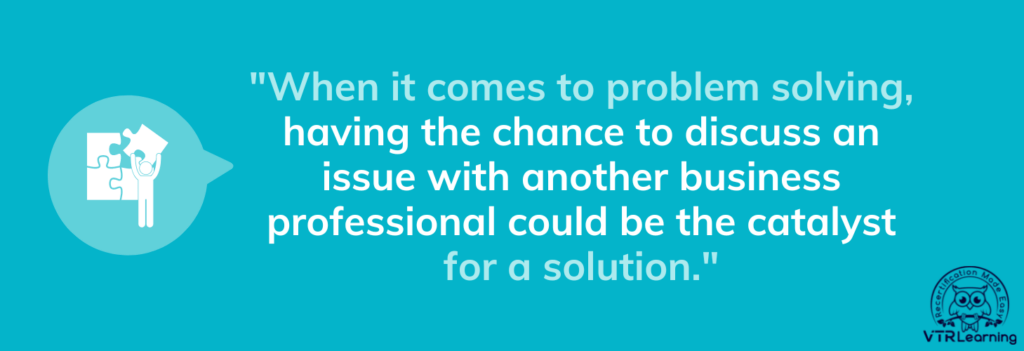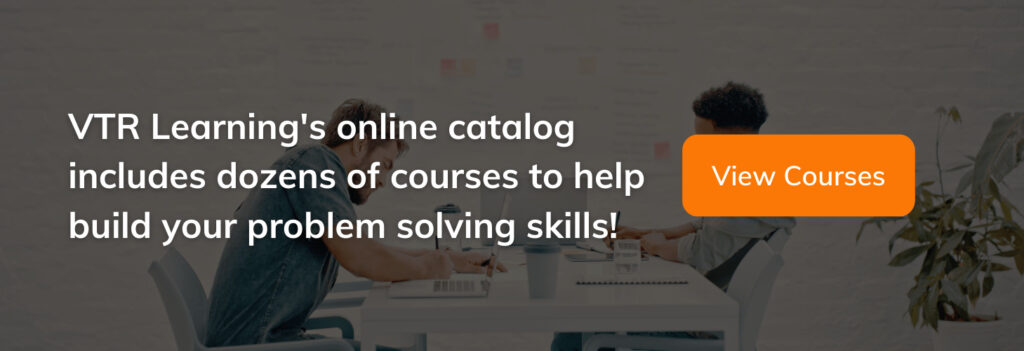
Problem solving skills aren’t developed in a vacuum. In other words, navigating difficult issues requires reliance on experiences, resources, and ultimately, other people. Because often, peers will be able to share valuable insights that you, yourself, might not initially see. After all, two heads are better than one, right? Sometimes, turning to peers means discussing a problem with a trusted coworker. Other times, it might imply reading up on the latest thoughts and ideas to find the best way forward. And as creatures who are constantly learning and adapting, this is all rooted in a basic concept: continuing education. In fact, the best method for problem solving is continuing education, because it enables individuals to see paths forward that aren’t immediately obvious. That’s why many professional organizations require their members to complete a certain amount of continuing education to maintain their licenses.
Whether or not you’re a member of an organization like SHRM, HRCI or the AICPA, you should be able to benefit from enhanced problem solving skills. After all, everyone has to put those skills to use on a daily basis, personally or professionally. So, if you’re wondering how continuing education might be able to benefit you, here are three ways it can increase your ability to solve problems.
How Continuing Education Strengthens Problem Solving Skills
Cross-Department Communication
Members of the Human Resources Certification Institute (HRCI) should be familiar with Business Credit. For those who aren’t, it’s a type of continuing education credit focused on providing HR managers greater familiarity with overall business functions. In a sense, it could be called cross-departmental or perhaps even administrative knowledge. But our interest is more in the mindset behind the requirement than with the credits themselves. The idea is that, by understanding how different departments of an organization function, individual HR managers have a clearer picture of their own role within the company. And that’s the first way which continuing education can lead to greater problem solving skills. Because with better understanding of function comes greater ability to communicate.
In part, the whole continuing education path seems like one big game of connect the dots.
- Continuing education can help individuals understand different departments.
- Understanding larger department functions can facilitate communication and collaboration.
- Better communication and collaboration can help solve problems expediently whenever they arise.
Sure, the line of thought might seem a bit simplified, but that doesn’t make it incorrect. The point is that continuing education can lead to better problem-solving skills when it comes to cross-departmental communication. If that wasn’t true, HRCI likely wouldn’t require Business Credit for some of their accreditation types.
Of course, this benefit of continuing education applies specifically to singular organizations. Cross-departmental communication happens within a company. But there are demonstrable ways that continuing education can help business professionals add to their problem-solving resources outside of their corporate organization as well.
Networking and Intercompany Communication
Typically, when people think of continuing education, they probably envision sitting at a computer and taking online courses. And in many instances, they would be correct. But there are multiple forms of continuing education opportunities, and one of those is event attendance. Most professional organizations allow members to earn credit at sponsored conferences. At these events, individuals can sit in on panel discussions, presentations or lectures that help provide new or important industry information. But perhaps as importantly, there is the opportunity to network, because thousands of individuals in similar industries will be in attendance. Acting as a nexus of sorts, conferences can help professionals get in touch and learn from their peers, building connections that could prove invaluable.
Sometimes, when problems arise, they are specific to one department within an organization. And in these situations, it helps to be able to discuss logistics with others who work in similar positions and conditions. Maybe an example would help. Suppose an HR manager had to determine how to motivate workers who constantly ran late. Of course, they would need to operate according to their company’s guidelines. But it might also help to discuss with other HR managers how they’ve dealt with similar situations. Building those types of connections at continuing education events can help make that possibility real.

So, while part of continuing education is learning new skills and ideas, another important part is building strong connections. Because when it comes to problem solving, having the chance to discuss an issue with another business professional could be the catalyst for a solution.
Staying Up-to-Date
Perhaps the most obvious way of strengthening one’s problem-solving skills through continuing education is by staying up-to-date with new information. Business is anything but static. It changes constantly, and so too do best practices for most industries. Chances are, whenever an individual encounters a problem, there’s already been someone else with a similar experience. And if that’s the case, there’s likely information available on how to deal with that issue effectively. So, part of the purpose of continuing education is to make business professionals familiar with the resources at their disposal. Especially when it comes to understanding key insights and new developments.
To some extent, staying up-to-date fits hand-in-hand with the other ways continuing education strengthens problem solving skills. Because attending conferences and networking are means for gaining knowledge. And in that sense, none of these methods are mutually exclusive. It all depends on the type of knowledge you want and how you want to get it.
Continuing Education Courses for Building Your Problem Solving Skills
Not every type of continuing education is right for every business professional. Some benefit most from corporate events. Others will become better problem solvers by sharpening their skills with online courses. At the end of the day, continuing education should meet the needs of the learner. So, each business professional must determine the best way forward in order to meet their own continuing education goals.
For those who learn best with self-study methods, VTR Learning offers a full catalog of online courses accredited with multiple certifying organizations. So, if you’re a business professional looking for opportunities to learn and improve your problem solving skills, look no further.
Article written by Braden Norwood
Last updated March 15, 2023




